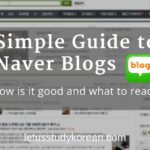[Vocabulary] 여기다
여기다 (yeo-gi-da) – consider/regard/think This is quite similar to ~(ㄴ)다고/(이)라고 etc. (reported/quoted speech) 생각한다 but more towards “consider” than “think” or “feel”. Of course, 여기다 is also a verb so you can attach it to a subject, just like 생각하다.…




